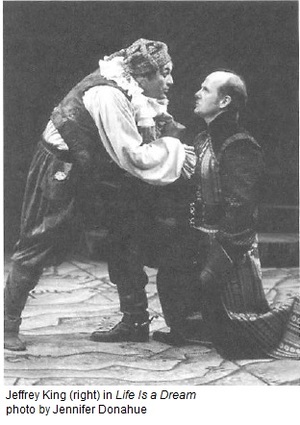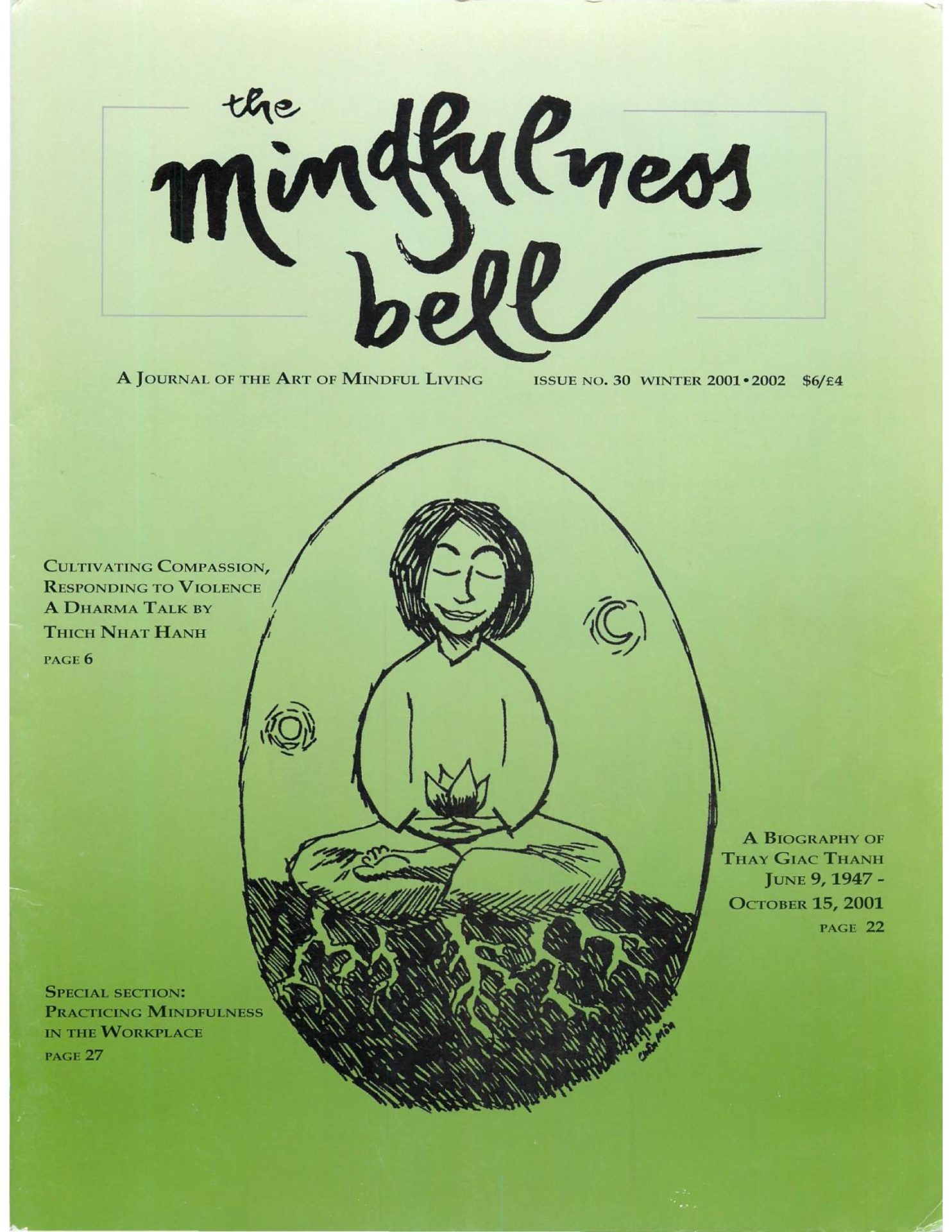an interview with Jeffrey King
Interviewed by Barbara Casey
Jeff, what led you to become an actor?
When I was a senior in high school I got into a drama class because the physical education class I wanted to be in was closed, In the drama class I started to feel a kind of release, a contact with something really deep, a feeling of being a conduit.
an interview with Jeffrey King
Interviewed by Barbara Casey
Jeff, what led you to become an actor?
When I was a senior in high school I got into a drama class because the physical education class I wanted to be in was closed, In the drama class I started to feel a kind of release, a contact with something really deep, a feeling of being a conduit. The only way I knew to continue to follow that feeling was to act. And still that's the reason I do it, to experience that kind of heightened and widened awareness. It ·feels like, having been introduced to an experience that was so necessary and essential in my life, I just followed it.
When were you introduced to mindfulness and how did that become your practice?
Acting was my practice long before I had any understanding of what mindfulness practice was, because it afforded these moments of opening, of heightened awareness. Following the same impulse as when I started acting, I began reading books on Buddhism, which I did for a long time, thinking that was the practice. Then I realized that reading wasn't affecting my life the way it would be if I actually did the things that I read about. So I went to the Zen Center in Los Angeles and I asked to learn to sit. Then I met Christopher/Caitriona Reed and I started sitting with her and became more aware of Thay and his way of approaching practice and that seemed more in tune with what felt right for me. There was much more interaction with nature and there was a feeling of real contact with the world, and a feeling. that when you're sitting you don't try to keep things out, you let things be and you observe them. That really drew me.
How has the practice of mindfulness affected your acting?
It's made acting easier. An actor needs to go in the direction the story or the character goes. But there's a freedom within that to allow the moment to be as it is; this is what's happened for me over the past several years. I'm less interested in making moments happen a certain way because I'm much more aware that the audience and I, the other actors and technicians are all creating our world in this time we're together.
Acting is much less stressful than in the past, and the special moments that used to come up once in a while are now more like one big long moment. I'm more often not thinking of something else when I'm on stage; I'm just listening to what's happening and breathing. One night I was doing Life Is a Dream and I had a thought that wasn't involved in the play and I just noted it, like I would if I were sitting; I said "thinking" and came back to the moment. I was actually experiencing the play as a meditation. It makes me more free and spontaneous and willing to accept whatever's happening within the context of the play.

Jeff plays a featured role in Life Is a Dream, one of the Oregon Shakespeare Festival's plays this season. Written in the 16th century by Pedro Calderon de la Barca, a Brazilian Catholic priest, the play is a strong and direct message of how mindfulness can transform the life of a person who is suffering through awareness of the preciousness of each moment. Two speeches by Segismundo, the main character, reflect this awakening: Segismundo: I'll dream the dream of courts and kings and drums and swords. But this time I will know it. A dream - but this time I will know that it is happening. This time be aware of it - be mindful of the moments as they pass - and this time I will be there for the living of them. Knowing from the start it all shall pass away will take away the fear - take away the few; and ease the pain. There. There. I feel it - a pair of steel gloves -lightening themselves around my heart. Hot blood rising in my throat. I can see it. Red and smoking - I can look it in the eye. It is not me. It is anger - not a part o.l me. Not me. It is a dream.It is a dream. It is a dream. Let it go. Let it go. I can see it. I can let it go.
Jeff, being an actor is a performance art and usually involves projecting some sort of ego; is that a hindrance to the practice of mindfulness?
If I' m trying to get something personal out of acting, I fall on my face because it precludes being really alive and present. And when my ego is out of it, it happens spontaneously. I'm doing Merry Wives of Windsor right now, and to do comedy I have to be so awake for the audience and present in the moment. If I'm thinking, "I' l look better this way or that way," the moment is gone.
Tell us a little bit about your current play, Life Is a Dream:
It's been very important to do this play because it exemplifies the central understanding of my practice, and that is, if you wake up in this moment, you are totally free. Part of this is learning to stop clinging to the past without forgetting the past. This is what happens to the main character, Segismundo; after being kept prisoner and being treated badly, he's freed and made the prince. His first reaction is to hang on to what's happened to him and to react out of that pain and he does unskillful things, he kills a man. So he's put back into his captivity and then through some awakenings within the story he's freed again and comes to genuinely forgive those who have put him there because he is now free to be alive right this moment. Part of that comes through his understanding that we dream the reality that we inhabit and we dream the identities that we possess. For him and for the character that I play, there is a spiritual awakening that has to do with release and with presentness.
It feels like right livelihood to be doing this play because 600 people a day come and see it and they are affected by it, they consider whether it's possible for someone to be treated that way and then to forgive those who did it to him. And it's a way of broadening my own practice and my own sense of compassion and generosity in the world.
How does being a member of the Order of Interbeing influence your acting?
Taking the Five Mindfulness Trainings was very important to me, because getting up in front of the community and saying, "This is how 1'm going to live" was really powerful. Over the course of time and coming to understand what the Order was about, it seemed like a way to deepen, to be an example within my Sangha, to my family and to myself. The Mindfulness Trainings feel like a natural way to live; they support me to be a natural person. In reciting them, I often see that I haven't studied and practiced one very well, and that's okay, because I will do it in the next two weeks. They support everything that 1'm trying to embody. I share a dressing room in the theater with thirty guys and the talk can get kind of raw. Sometimes I just write a number "4" and put it up on the wall, and I see it and remember, 1'm free to be mindful of my speech down here. That's very helpful and I thin.k it influences everyone in the room without my even saying anything.
If there are mindfulness practitioners who have a desire to act, what would you say to them?
If they really want to, they should just do it. If you are practicing mindfulness, then you are already way ahead of the game with acting because good acting is the embodiment of mindfulness. Performing can be a wonderful way to drop off a lot of constrictions about who you think you have to be. It's a very free place on stage; when you see someone acting who is really alive, they affect you. It doesn't matter where you are doing it, just walk onto a stage and breathe, walk out the door and breathe, it's the same life, it's just very free.
Jeffrey King, True Awakening of the Dharma, is an actor with the Oregon Shakespeare Festival. He lives in Ashland, Oregon with his wife and two children, and sits with the Community o/Mindful Living, Southern Oregon.

